Real wealth is a measurement of a robust ecology and of the general health and happiness of the people!
We live in times of extreme contrast and conflicting frames of reference which identify and define reality. In one reality the media informs us of accelerating species extinction, peak oil, peak soil, peak potable water or of the thousands of people fleeing drought, famine or war. In the past decade this bad news is being eclipsed by global warming related disasters. The message is clear – the level of human-activity is far beyond what our small blue planet can sustain.
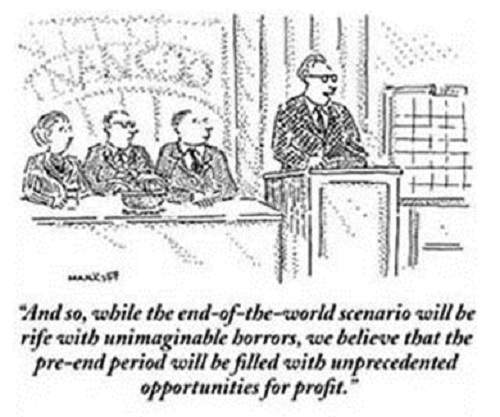
In stark contrast the same media sources switch to news of our state or federal governments that follow the economic paradigm of everlasting growth – translated as growth in human-activity. Almost every median newscast speaks of our country’s growth rate and unemployment numbers over last quarter, followed by speculation of future trends. In today’s general paradigm these are considered as important indicators of our social and economic well-being. The message is clear - growth is good, increased unemployment is bad, and we must do what we can to ensure in human-activity continues.
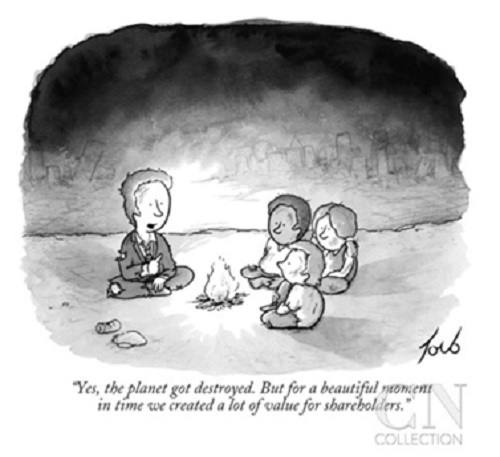
We should be perplexed by this conflict, but as psychologist Daniel Goleman states:[i]
There is an almost gravitational pull toward putting out of mind unpleasant facts. And our collective ability to face painful facts is no greater than our personal one. We tune out, we turn away, we avoid. Finally we forget, and forget we have forgotten. A lacuna hides the harsh truth.
In a recent book by psychologist Per Epstein Stoknes called, ‘What we think about when we try not to think about Global Warming’.[ii] Stoknes deals with elements of cognitive dissonance that keeps us from despair as we track on, carrying out our daily routines as if we were not faced with such a perplexing conflict. The vested interests that finance the denial industry feast on this human characteristic as they cast doubt on science and make the unbelievable become believable in order to sustain our comfort zone - all is well, global warming is a conspiracy, no need to change our ways, etc.[iii]
These messages bring comfort to the many, but fortunately, not to everyone. The question of human nature comes into the picture, showing the rich diversity of our basic psychological makeup.
Huston, we have a problem!
This subtle message came from the Apollo 13 astronauts after they recognized an issue that put their mission and lives in grave danger. An emergency plan was designed, discussed, improved on, agreed to, and then put into action. The crew was saved. Note: Development of a plan that could work is an essential first step: But it does not guarantee that it will work!
Planet Earth, ‘we the people’ have a paradigm problem!
But we live on a small blue planet, and there is no ‘Huston’ to call for help. So who then? This is a good time to recall the old Pogo line, I have seen the enemy, and it is us!
Anyone who has taken a serious look into any one of these three key areas: (1) The state of the global Environment; (2) society’s perceived Energy growth needs VS future supply; (3) Growing Economic and monetary corruption and conundrums, will recognize that we are on the cusp of paradigm change - a junction, a bifurcation point. To go past the tipping point of any one of the three interconnected “Es” - Ecology, Energy, Economics will bring about the end of a 150 year era of compound growth in human-activity that has been primarily energized by fossil fuels. And 97% of the world’s scientists agree that global warming is human caused.[iv]
And yet, we the people blindly follow our governments because of, TINA - There Is No Alterative, as coined buy UK Prime Minister Margarete Thatcher during the right wing Regan years in USA.
To date, TINA remains true because many proposals for change appear to stop at the door the nation’s corporate banks and the pathological debt based money supply system. In this regard, in a recent email group exchange, this comment came up:
There appears to a disabling mystique behind the curtain at the end of the yellow brick road, and not many people want to pull back the curtain to describe the magical strings, and who is plucking them.
The course we follow took a sinister turn a hundred years ago when the US Federal Reserve came into being along with the official debt-based fractional-reserve money-creation banking system. The Federal Reserve is a chaordic[v] organization operated (mostly) for, and on behalf of, commercial banks. At that time the human population was less than 20% of today’s burgeoning numbers, and our collective ecological and energy footprint was likely within the carrying capacity of our small blue planet. It is the growth-oriented nature of the debt-based banking system that makes economic growth essential – because without growth it will crash. We must develop an alternate.
However, the fundamental issues lie much deeper than 100 years ago. As soon as humans recognized that barter is inadequate for trading, someone came up with the idea of a token to represent a shared agreement of value. Over the millennia tokens have ranged from metal coins to tulip bulbs to paper notes to computer ones and zeros.
Human nature comes into play again. Due to human diversity of intelligence, aptitudes and talents, famers like to farm fisher men like to fish, some like to teach and some people like accounting - and some of these accounting folks became the administrators of the money system. And the farmers and fishermen are happy to use ‘money’ and to have someone else take care of the details. Self-interest is a prime motivator of humans and soon the bankers developed a sense of entitlement and recognized they could become very rich as the local money exchanger because their customers either did not fully understand the system or did not seem to care, as long as it worked for them. But a couple thousand years ago their greed caused at least one group money changers to have an issue with famous protestor:

Christ Driving the Money Changers from the Temple [vi]
Jesus threw the money changes out of the temple, along with some merchants, accusing them of turning the temple into a den of thieves. However, over the years after many such protest and revolutions or simply financial system crashes, they keep coming back. Even after the 2008 partial melt-down of the financial industry, the majority of the banks that were part of real-estate Ponzi scheme that cause the collapse, are still the main players in the money world. Since they are ‘too big to fail’, they are now essentially a part of government. According professor Sheldon Wolin[vii], what had been democracy can now referred to as, inverted totalitarianism, Economics, the dismal science (Wicki), deserves this secondary name because over the centuries the various banking/monetary arrangements have been a boom/bust phenomenon[viii]. It is inherently unstable from lack of a realistic anchorage to our ecological, biophysical and energy world.
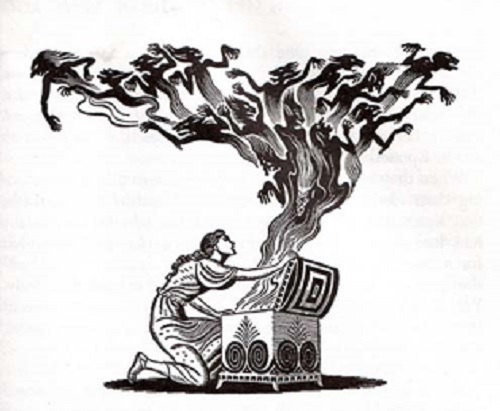
In the past century our use of the human-created money system, in combination with massive fossil fuel usage have turned out to be equivalent of opening Pandora’s Box (Wicki). The green revolution appeared to cancel Malthus’ dire predictions of overgrowth and die-off but now the symptoms are clear: excess human-activity now disrupts the Gaian complex systems of nature to such a degree that the long term viability of our species is in question. Many deep thinking scientists like Sir Martin Reese[ix], past president of the science based Royal Society, hold very little hope because the problems appear too big to fix and there is, as yet, no glimmers of hopeful change on the horizon.
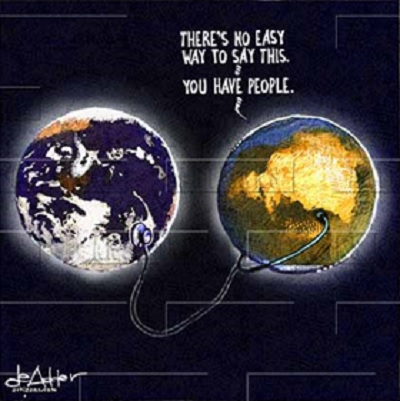
A Post Normal Approach– Envisioning ecological macroeconomics
My background is engineering. From time to time over the years I’ve been tasked with dealing with complex systems that no longer meet new or changed requirements. Whether to totally replace a system or subsystem or to modify key components is often the question.
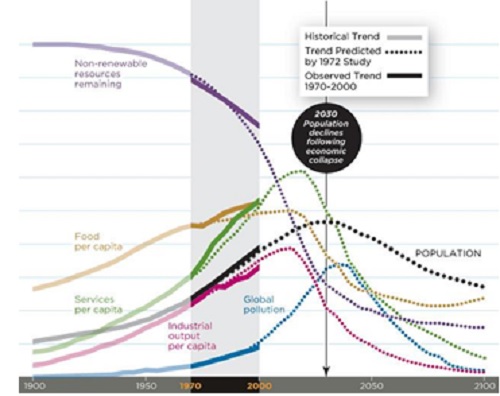
About 30 years ago I read the ‘72 book, Limits to Growth (Wicki). It was shocking to say the least. I then began an intensive study of human psychology in order to understand why the animal with our self-given name, homo-sapience, could be so stupid. This side journey has been enlightening, as it seems that a general understanding of human nature will be an essential part of the knowledge base that might underlay a proposed holistic solution to the human predicament. This learning process had been summarized in a web booklet called Paradigm Junction[x]. This paper is based on data within that booklet.
One thing that soon became clear is this: If we are to entertain the possibility of a transition to a relatively stable sustainable civilization, we will need to replace the monetary/economic subsystem. Specifically, the debt-based commercial bank controlled fiat money generation system. This pervasive element of civilization cannot be modified or tinkered with. Today’s Monetary Economic System (MES) must be replaced. The new monetary/economic system must act, not only act as the tool to facility the exchange of goods and services, but it must also be capable of playing various other important roles,
Post Normal Speculation: [xi]
In engineering, when new concepts are imagined we move from sketch to a model of the finished product. We can then decide the best way to acquire parts and assemble the first prototype. Quite a lot is generally known about many of the parameters that will affect the outcome, such as in the case of a new type of aircraft, or a new energy conversion system. However, in the case speculating on the design of, sustainable human civilization, the term post normal encapsulates the changed parameters.
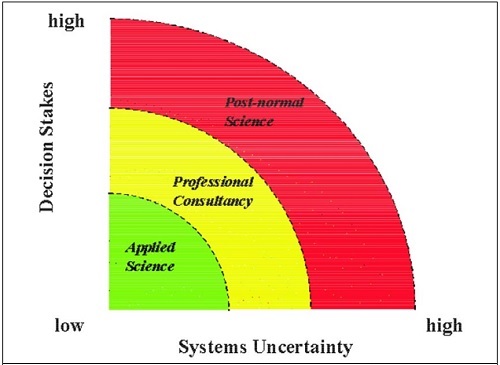
Drawing from a 2003 ISEE presentation by S.Funowitz & J.Ravetz [xii]
This figure shows the diminishing certainty and increasingly high stakes as we move out from relatively familiar applied science toward the fuzzy world of post normal – out future.
Post-normal science is a concept developed by Silvio Funtowicz and Jerome Ravetz who illustrate a methodology of inquiry that is appropriate for cases where, facts are uncertain, values in dispute, stakes high and decisions urgent (Funtowicz and Ravetz, 1991). It is primarily applied in the context of long-term issues where there is less available information than is desired by stakeholders.
These conditions certainly apply to the rest of this presentation which ends with design sketch of system of global governance might look like in 50 years if we start to change a few key elements of our existing paradigm today. For convenience we’ll refer to this draft model, 50APC, representing 50 Years After Paradigm Change.
Here are a few rambling thoughts that have gone into formulation of the suggested approach:
Humans, as our planet’s top predator we are following nature’s typical scenario of, overgrowth and die-off, resulting from our massive human-activity, now enabled mostly by fossil fuels. Therefore, future governance must be developed in ways to deal with natural elements of our human-nature that cause us to behave like any other species that find a niche environment, and to appear no smarter than yeast. This means that our system of governance must focus on counteracting a few specific human tendencies that are imbedded in our genetic makeup.
The Gaian systems (Mother Nature) that operates on sunshine is an interactive non-guided dynamic system. But each living biological elemental part of this grand system is guided by an impulse to survive and reproduce.[xiii]
The subsystem of human civilization is currently energized primarily by fossil energy. Civilization is an interactive non-guided dynamic system. But each corporate or private enterprise, from farmer to transnational corporation, is guided by a will to survive and expand.
We cannot change the system of Gaia, indeed we don’t fully understand it. But all laws and procedures and protocols of the system of civilization are human created and therefore can be changed as needed. Therefore, the system of civilization can be changed into a ‘guided’ dynamic system with a long-term goal of survival within the dynamic system of Gaia.
Since our spending habits are highly influenced by our available cash, it would be fair to say that money acts as a control valve, or a regulator, of human activity. With only a small amount of money, we don’t spend much, using fewer resources: With more money we spend more, especially when encouraged by corporate sponsored social media. We can then assume then, that if the human-activity regulator was part of a holistic dynamic system, and that regulation was guided toward negative growth in human activity by a reduced monetary flow rate, then perhaps one day we humans could reduce our global ecological footprint to less than 1:1: And our Gaian living system could begin to heal. But in contrast, today’s debt-based fiat money system acts like a stuck regulator, accelerating human-activity at full throttle to continuously invigorate the demand side – even while nature’s biophysical and energy supply side slips away into oblivion.
Surely we must do whatever is necessary to gain control of that critical valve.
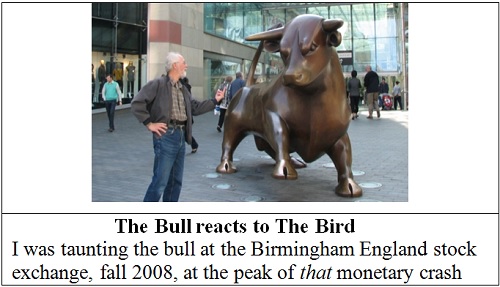
4a:
‘You can't manage what you don't measure. It is an old management adage that is accurate today. Unless you measure something you don't know if it is getting better or worse. You can't manage for improvement if you don't measure to see what is getting better and what isn't’.[xiv]
In mid 2015, with public resistance in Germany growing from the large numbers of refugees, Chancellor Angela Meckel said something to the effect, But we don’t know how many people Germany can safely absorb!
This comment underlies one of the greatest human management failures of our times. World leaders simply cannot manage if they don’t have up-to-date scientific data on the many factors that would go into assessing the human Carrying Capacity (CC) within their borders. Failure to have developed this vital information leads us to where we are today - where well respected scientists question whether humans will survive this century.[xv]
Today we have the scientific and communications tools to measure the needed critical parameters that would provide data to estimate the CC of any and all regions on Earth. And we have adequate global data to facilitate a full instrument panel of the critical parameters needed to provide wheelhouse guidance for our small blue planet. With such instrumentation we can measure basic Real Wealth, from a human perspective.
As stated by Riane Eisler in her ‘98 book, The Real Wealth Of Nations - “Real Wealth is a measurement of a robust ecology and the general health and happiness of the people!”.
The Need for a biophysical-based paradigm in economics in the second half of the age of oil
This is the title of a 2006 paper by C.Hall and K.Klitgaard.[xvi] Now, let’s speculate on the design!
In his ‘98 book, Earth at a Crossroads: Paths to a Sustainable Future, Professor Hartmut Bossel[xvii] presents his outline for the minimum requirements for a sustainable civilization. He uses the term, pathways to the future, in his envisioning effort. Bossel’s book is about dynamic systems and also how dynamics can apply to social organizations such as governments. As such, his pathways scenario has many details that are closely aligned with those in the Blue Planet Governance (BPG) chapters, including the need for a new and different monetary system. In a paragraph to justify the need to change certain elements of society to operate by dynamic principles Bossel explains why something less will simply not work. In a “Reality Check for Pathway B” he states:
"Path B flies in the face of current mainstream economic thinking. It would require drastic changes in the current system. It would have to turn around very strong current development trends. So is it realistic? And above all, is it really necessary to change the current system so much to make it sustainable? Couldn’t we perhaps just introduce small changes in the present system to achieve the same result?"
No. In looking for another riverbed of future development, one tries to find a solution that is as close as possible to the old one. Path B is as close to the old one as sustainability would allow. If one compromises on this or that, the path is no longer sustainable.“
Fortunately, in the 20 years since Bossel wrote his book, there has been a groundswell of social change organizations working to develop many of the changes he suggests. A few of these are:
— Movements toward regionalization;
— Efforts to create local banks and currency systems;
— Initiatives to develop more worker-owned corporations.
— Recognition that large nation states such as USA, Canada, Russia, China, are simply too large to govern satisfactorily because of cultural and bioregional differences.
— Many of these movements are itemized in a 2016 book by Gar Alperovitz[xviii], What Then Must We Do.
However, as yet these important initiatives toil in separate silos. But they could gain dynamic synergy if their efforts were bound together cooperatively by one overall common vison of a viable future.
Bossel goes to great lengths to assure the reader that he is introducing nothing different from others who envision change toward sustainability: That suggested different social scenarios do not need to be immediate, and can evolve over time, at different times in different places. These thoughts are in close alignment with the Blue Planet Governance (BPG) proposal in the Paradigm Junction booklet that provides details of the interactive system function and how the social transition may occur by dovetailing with many of the growing number of localization and other social change movements.
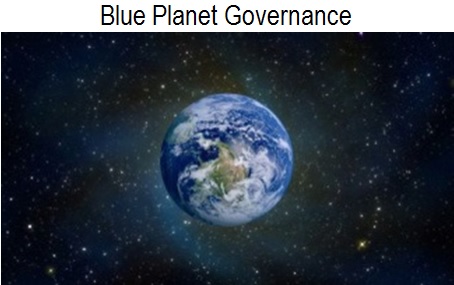
Here is a list of 14 comments based on Bossel’s book that appear to be in line with the background thinking for Blue Planet Governance (BPG)[xix] proposal in Paradigm Junction:
- Globalisation in its current form be should be seen as evil. p10
- We have common understanding of the nature of and importance of systems thinking.
- Individuals can learn to accept a feeling of moral responsibility toward our common future and of those who will follow.
- We must accept that we are a part of nature, not a special species.
- Global standards must be developed and respected with regard to the environment, trade and other areas of common interests.
- While some common standards are essential, a robust system requires diversity of subsystem components such as variety in regional cultures and social practices.
- “The unaccountable shareholder”, must be removed from control of local resources, e.g., absentee landlords.
- Private ownership of the commons must end.
- Money available for human activity must be dynamically tied to the availability of replenishable resources to support the activity. (Bossel does not expand on this key idea)
- Instead of military intervention, trade sanctions, tariffs and education must be the primary tools to coerce reluctant regions into participation in the global network of agreements and standards.
- Subjects related to sustaining the living systems of our small blue planet must be taught in schools from an early age. Understanding of foundational issues must become a prerequisite to the right to vote.
- Regions need to have control over immigration.
- Regions need to have their own currencies, and yet a means of trade with other Regions.
- There needs to be an agreed balance between one’s personal right to procreate, and the right of people of the region to have a sustainable future.
The Paradigm Junction booklet addresses these points. Here we’ll focus on overview of the proposal with a post normal sketch of how it could be 50 Years After Paradigm Change, if many of today’s rivers-of-change were to coalesce toward a systemic plan that is rooted in recognition of human needs – Real Wealth.
Real wealth is a measurement of a robust ecology and the general health and happiness of the people!
(050) APC
This envisioning section is written in backcast – spoken from a relatively stable future period where the speaker is explaining the interactivity of the social, political and economic dynamic systems of the day.
At this time the world is divided into highly autonomous regional units where the monetary wealth of each region is based on measurement of the many factors that comprise the region’s gross real wealth – wealth-factors. Regional wealth is expressed as wealth per capita to bring regional population levels into the mental-sphere of the people.[xx]
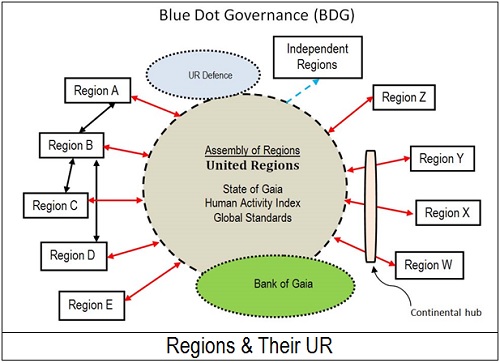
Regions & Their UR
The United Regions (UR):
The UR is the name given to Blue Planet Governance (BPG) organizational collective. UR leadership is from a regional representative in the Assembly of Regions. The assembly representatives are from each of the 96 (?) Regions of the world that have chosen to benefit from the Blue Planet Governance (BPG) chaordic/cooperative. The assembly represents the collective voice of all Regions of the world. The lead scientists, economists, psychologists and other specialists that head the other sections of UR are selected by the Assembly of Regions.
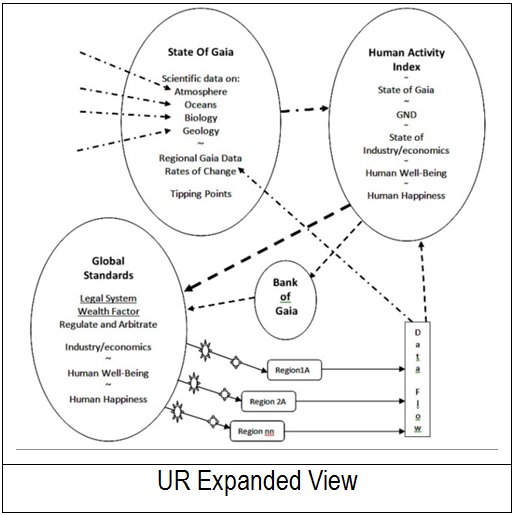
UR Expanded View
Except for the requirements of membership in the United Regions, each Region remains highly autonomous, and the daily life of most people has, to a large degree, changed very little. The levels of local government with most Regions remain as before with city, county and the Regional governments.
The UR administers global issues that are beyond the scope or mandate any individual Region such as:
- To police the global commons;
- To establishing global standards and laws parting to BPG;
- To arbitrating inter-regional disputes, etc.
- And to enable the Bank of Gaia to establish the maximum cash flow of each Region, based on monthly Regional Real Wealth reports;
Where applicable, the UR and many Regional governments borrow procedures that are common it large corporations that follow Quality Assurance (QA) system guidelines. An overview of these ideas presented in Paradigm Junction 4ab.
[xxi]
Many Regions of the world had been small countries prior to Paradigm Change and they are able to maintain most of their historic cultural values and traditions. Some had been states or provinces of larger countries. Some have borders based on cultural or geographically defined boundaries.
The fact that Regions are relatively small gives individuals and small communities a greater sense of empowerment toward influencing Regional affairs as the appeal of localization strengthens the social bond, in the form of Regionalism, supplanting what had been nationalism.
This social/political/economic configuration is intended to provide Syntropy[xxii], a reversal in entropy and a tendency towards order and togetherness under a collective system of governance for our small blue planet.
The UR monthly State Of The World[xxiii] report includes the WPC (Wealth Per Capita) rating of each participating Regions, and a summary of global real wealth.
Regions: Some of the regions were once small counties some had been states or provinces of larger countries. Some were formed out of common cultural interests or common bioregional interests such as drainage basins, or mountain regions. Here are some of the features:
- Regional governments are democratically elected.
- There is no private ownership of land. The lands, forests and lakes are under the stewardship of the Regional government, but can be leased to individuals or corporations.
- UN recommends that each Region have a minimum wage for a person, and a maximum annual income.
- Regional money is generally expressed on a per capita basis.
- Regional governments are the shareholders all public corporations, not individuals as it was BPC (Before Paradigm Change).
The world of 050APC has many more features designed to systemically reduce human civilization’s collective ecological footprint until Mother Nature can recover from our excesses: And when someone asks, “Are Humans smarter than yeast?” , we can at least say, perhaps.
The road between today and relatively smoothly operating potential future with a chance of long-term stability is in the hands of today’s young leaders with a viable plan. The few who are comfortable in post normal speculation must take a first sketch, to discuss it, and to infuse it with group wisdom and then bring it to the public and the thousands of social change initiatives that are currently pursuing paths in the same direction, and to bring them into a common movement toward Blue Planet Governance, or whatever name the core team should chose. Our journey will be chaotic, but not necessarily catastrophic.
Are we ready to enact?
On November 12, 1936 Winston Churchill grew so exasperated with the continuing failure of Britain to prepare for Hitler’s onslaught that he charged in a speech to the House of Commons: “The government simply cannot make up their minds, or they cannot get the Prime Minister to make up his mind. So they go on in strange paradox, decide only to be undecided, resolve to be irresolute, adamant for drift, solid for fluidity, all –powerful to be impotent... the era of procrastination, of half-measures, of soothing and baffling expedients of delays, is coming to its close. In its place we are entering a period of consequences.”
NOTES
[i]
’Daniel Goleman ’85 Vital Lies and Simple Truths: The psychology of self-deception
[ii]
Per Epsen Stoknes ‘’15 What We Think About When We Try Not To Think About Global Warming. This book as a great introduction by Jorgen Randers, one of the MIT team who developed the ‘69‘Limits To Growth’ scenarios on behalf of The Club Of Rome. This was one of the first warning shots that temporarily awakened world governments of the human predicament. http://blog.ucsusa.org/melanie-fitzpatrick/scientists-agree-anthropogenic-climate-change-is-real-but-wait-didnt-we-know-this-already-128?_ga=1.141276466.1695032441.1450746090 “…. over 97 percent of papers confirm – that global warming is real and largely caused by humans.”
[iii]
Fear Uncertainty Doubt (FUD) See
http://countysustainability.ca/political_game_changer.html
The new masters of public deception learned from the tobacco industry in the early ‘70s. To counter scientific studies showing the negative effects of smoking, it was in the self-interest of the tobacco industry to create a smokescreen of doubt. The process is well documented in a short video that can be viewed here: http://tinyurl.com/cahcax4.”
[iv]
http://blog.ucsusa.org/melanie-fitzpatrick/scientists-agree-anthropogenic-climate-change-is-real-but-wait-didnt-we-know-this-already-128?_ga=1.141276466.1695032441.1450746090 “…. over 97 percent of papers confirm – that global warming is real and largely caused by humans.”
[v]
Chaordic organization. See http://p2pfoundation.net/Chaordic_Organizations_-_Characteristics
- Are based on clarity of shared purpose and principles.
- Are self-organizing and self-governing in whole and in part.
- Exist primarily to enable their constituent parts.
- Are powered from the periphery, unified from the core.
- Are durable in purpose and principle, malleable in form and function.
- Equitably distribute power, rights, responsibility and rewards.
- Harmoniously combine cooperation and competition.
- Learn, adapt and innovate in ever expanding cycles.
- Are compatible with the human spirit and the biosphere.
- Liberate and amplify ingenuity, initiative and judgment.
- Are compatible with and foster diversity, complexity and change.
- Constructively utilize and harmonize conflict and paradox.
- Restrain and appropriately embed command and control methods.
[vi]
Jesus and the bankers: http://en.wikipedia.org/wiki/Cleansing_of_the_Temple
[vii]
Professor, writer Sheldon Wolin refers to the current state of affairs as, Inverted totalitarian. Economics is democracy’s primary failure, https://www.youtube.com/watch?v=YjfKosDBOzQ.
[viii]
https://en.wikipedia.org/wiki/List_of_economic_crises
[ix]
This essay be Guy McPherson illustrates the pessimism from people such a as David Suzuki and Martin Rees, http://guymcpherson.com/2016/03/picking-cherries-again/.
[x]
The short booklet, Paradigm Junction, provides essential basics, with the chapters of section 4 focusing on envisioning. A scenario describes the basic operation of global society 50 years after paradigm change. It describes how a commodity-based monetary system is derived from the scientifically measure natural and social wealth within of each region of the world, and how the monetary flow control is able to regulate human-activity in an acceptable civilized fashion in order to bring the human ecological footprint to less than one.
[xi]
Post-normal science is a concept developed by Silvio Funtowicz and Jerome Ravetz, attempting to characterize a methodology of inquiry that is appropriate for cases where "facts are uncertain, values in dispute, stakes high and decisions urgent" (Funtowicz and Ravetz, 1991). It is primarily applied in the context of long-term issues where there is less available information than is desired by stakeholders. https://en.wikipedia.org/wiki/Post-normal_science.
[xii]
Post-Normal Science (PNS) is a new conception of the management of complex science-related issues. It focuses on aspects of problem solving that tend to be neglected in traditional accounts of scientific practice: uncertainty, value loading, and a plurality of legitimate perspectives. …. http://leopold.asu.edu/sustainability/sites/default/files/Norton,%20Post%20Normal%20Science,%20Funtowicz_1.pdf.
[xiii]
See the notes on Daisy World https://en.wikipedia.org/wiki/Daisyworld as example of how biophysical life can change the world.
[xiv]
http://management.about.com/od/metrics/a/Measure2Manage.htm While this management consultant site is about increasing corporate profits, the same message applies to reaching goals in any complex system.
[xv]
Mar 21 Avoiding collapse: Grand challenges for science and society to solve by 2050
See: https://elementascience.org/articles/94, Paul Ehrich. From the abstract: We maintain that humanity's grand challenge is solving the intertwined problems of human population growth and overconsumption, climate change, pollution, ecosystem destruction, disease spillovers, and extinction, in order to avoid environmental tipping points that would make human life more difficult and would irrevocably damage planetary life support systems. Or ?? Martin Rees…….
[xvi]
Hall & Klitgaard: More fundamentally, some twenty years ago in the journal Science, Nobel prize winner in economics Wassily Leontief found the basic models of economics “unable to advance in any perceptible way a systematic understanding of the operation of a real economic system.”
http://www.peakoil.net/files/the%20need%20for%20a%20new%20biophysical-based%20paradigm%20in%20economics%20....pdf.
[xvii]
Hartmut Bossel, http://www.hartmutbossel.de.
[xviii]
http://whatthenmustwedo.org Alperovitz calls for an evolution, not a revolution, out of the old system and into the new. That new system would democratize the ownership of wealth, strengthen communities in diverse ways, and be governed by policies and institutions sophisticated enough to manage a large-scale, powerful economy. - See more at: http://whatthenmustwedo.org/#sthash.FprPPtq0.dpuf.
Alperovitz explains that, for many reasons large nations such as USA, Canada, Russia, China, as example, are too large to govern satisfactorily and that smaller Regional governments are likely to serve the people much better.
[xix]
The name, Blue Planet Governance is based on Carl Sagan’s remarks when he saw a picture of our planet in a photo taken from deep space, Earth look like a small blue dot. It is good to remind ourselves of how insignificant we humans are relative to the massive universe.
[xx]
A companion paper, Dynamic regulation of human-activity through socio/biophysical economics [http://www.isecoeco.org/wp-content/uploads/2016/09/Blue-Planet-Governance.pdf] expands on this envisioned future section providing greater detail of the psychological grooming of Blue Planet Governance, in order to enabling monetary flow control (dynamic regulation) to effectively motivate individuals, and communities toward limiting their human activity as needed.
[xxi]
Chapter PJ/4a illustrates how corporate management has many policies and procedures that could work extremely well in global and regional governance. http://gaiapc.ca/PJ/4ba-050APC.pdf
[xxii]
Syntropy: A togetherness movement – or the tendency towards energy concentration, order, organization and life, the opposite of entropy. http://www.syntropy.org
[xxiii]
The name, State Of The World, report is borrowed from an annual book produced by the Worldwatch Institute. Lester Brown was the leader of this influential organization of the 1980s & 90s.
To download this article in slide presentation format, CLICK HERE
|
ABOUT THE AUTHORS
Don Chisholm is the Director of the Gaia Preservation Coalition. He is a retired engineering technologist whose career path dealt with dynamic systems, maintenance, design, management and quality assurance auditing, generally related to the aviation industry. The past thirty years have been spent studying human behaviours, energy, and other areas related to the human predicament. For his complete biography and contact information, click here.
|